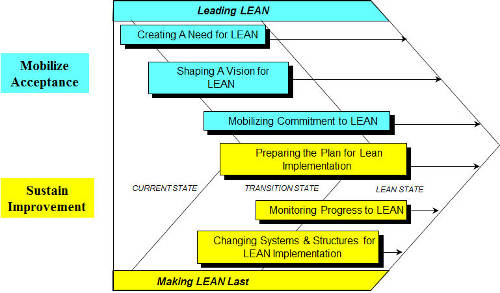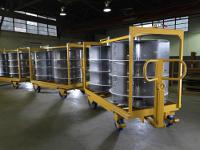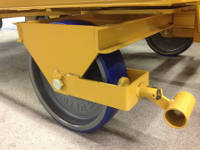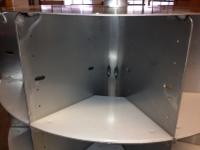Lean manufacturing has become more than just a buzzword. Lean companies like Hamilton Caster are more efficient. But Hamilton doesn't just practice lean, it helps its customers on their journeys, too.
Lean manufacturing, in a nutshell, means removing unnecessary steps, motions, processes, and waste in the production process. By eliminating the unessential, delivery and production times decrease while product values increase. Imagine the opposite of a Rube Goldberg machine.

Custom Trailers for Improved Efficiency
 When a global engine manufacturer needed unique carts to deliver parts to an assembly line, a local distributor recommended Hamilton. To design the optimal trailer, Hamilton engineers studied the manufacturer's process:
When a global engine manufacturer needed unique carts to deliver parts to an assembly line, a local distributor recommended Hamilton. To design the optimal trailer, Hamilton engineers studied the manufacturer's process:
- Engine parts are placed on the trailer in the proper sequence for eventual use in assembly of different models.
- Once loaded in a warehouse, the trailers are hauled to an assembly line in a separate facility and then delivered via power towing to specified points on the line.
- Operators manually maneuver the loaded carts into position and access the 48 parts while mating the part to the assembly on the line.
The customer, distributor, and Hamilton engineers designed a custom cart that satisfied all the assembly line needs.
Creating an Optimal Trailer
 Hamilton began with 12-in. diameter wheels with Poly-Soft tread and precision ball bearings for easy rolling of the 2,000 lb capacity carts. Smaller wheels would have increased the force required to move the loaded carts. Additionally, since they are more resilient than industry-standard poly, poly-soft tread requires only about half of the force to move, it's quieter, and repels small particles that typically become embedded in standard poly wheels. Hamilton designed a special bearing for the fifth wheel assemblies to aid the manual steering required to finesse the carts into place. Hamilton also devised a simple and easily actuated brake pedal to enable operators to lock the carts into position. Throughout this project, you'll notice that simplicity is valuable in lean design.
Hamilton began with 12-in. diameter wheels with Poly-Soft tread and precision ball bearings for easy rolling of the 2,000 lb capacity carts. Smaller wheels would have increased the force required to move the loaded carts. Additionally, since they are more resilient than industry-standard poly, poly-soft tread requires only about half of the force to move, it's quieter, and repels small particles that typically become embedded in standard poly wheels. Hamilton designed a special bearing for the fifth wheel assemblies to aid the manual steering required to finesse the carts into place. Hamilton also devised a simple and easily actuated brake pedal to enable operators to lock the carts into position. Throughout this project, you'll notice that simplicity is valuable in lean design.
Rotating Carousels
 Sequential loading ensures the operator has the right part at the right time. Parts must be in the acceptable reach "zone" for multiple operators, with nothing too high or too low. Rotating carousels spin easily for part access without moving the cart and an available lock prevents rotation during transit. Shelves slope slightly downward, away from the opening, to prevent parts from spilling out when the cart is moving. Each space is lined with ultra-high molecular weight (UHMW) material to protect part finish. Drainage at the center of each carousel prevents any pooling when the carts are washed.
Sequential loading ensures the operator has the right part at the right time. Parts must be in the acceptable reach "zone" for multiple operators, with nothing too high or too low. Rotating carousels spin easily for part access without moving the cart and an available lock prevents rotation during transit. Shelves slope slightly downward, away from the opening, to prevent parts from spilling out when the cart is moving. Each space is lined with ultra-high molecular weight (UHMW) material to protect part finish. Drainage at the center of each carousel prevents any pooling when the carts are washed.
Just as Durable
Keeping weight down is important when moving carts manually, so Hamilton crafted the carousels from aluminum and eliminated unnecessary material from the cart. This reduced the weight while preserving the structural strength.
Versatility is Key for Quick Adjustments on Factory Floor
The carts have towing tongues on the front and pintle hitches on the rear. Towing tongues face frictional wear and tear. That's why Hamilton carts include forged steel loops, providing years of dependable use. As many as six carts may be connected at a time into a "train" and four-wheel steering enables the entire train to track in the same pathway around turns, minimizing aisle width requirements. For safety, tongues are stowed in the vertical position, held in place with rubber stops, and hinged to prevent inadvertent drops. Tie rod guards span the distance between front and rear wheels along each side to protect the exposed tie rod from damage by forklifts when lifting the carts from the side.
The top section, with the carousels, can be completely removed from the base. These two assemblies are held together with only four bolts, so detaching the top is easy. This affords the engine manufacturer to apply all-new superstructures to existing carts should their needs change.
Carousel shelves adjust and permit the manufacturer to adapt them to change in the size and shape of parts. Plus the design allows a carousel to be easily replaced if it is damaged.
Still Lean and Mean
Manufacturing successfully in a lean environment includes:
- Improving workflow
- Minimizing walking and other wasted motions
- Presenting parts to workers in the best way
- Addressing ergonomic issues
- Structuring the work to minimize the likelihood of errors.
These custom Hamilton carts play a key role in the lean assembly operation, addressing these issues and helping the engine manufacturer get more bang for its buck.
Hamilton Caster can customize solutions for companies on their journey to more efficient processes. For more than 100 years, this American manufacturer has handled the pressure of material handling's heaviest and most complex jobs, building ultra-durable casters and trailers to thrive under years of use, no matter the application. Hamilton products can boost warehouse e-fficiency, increase productivity, and reduce overhead costs, and the company's custom-engineered casters and trailers to haul just about anything.


